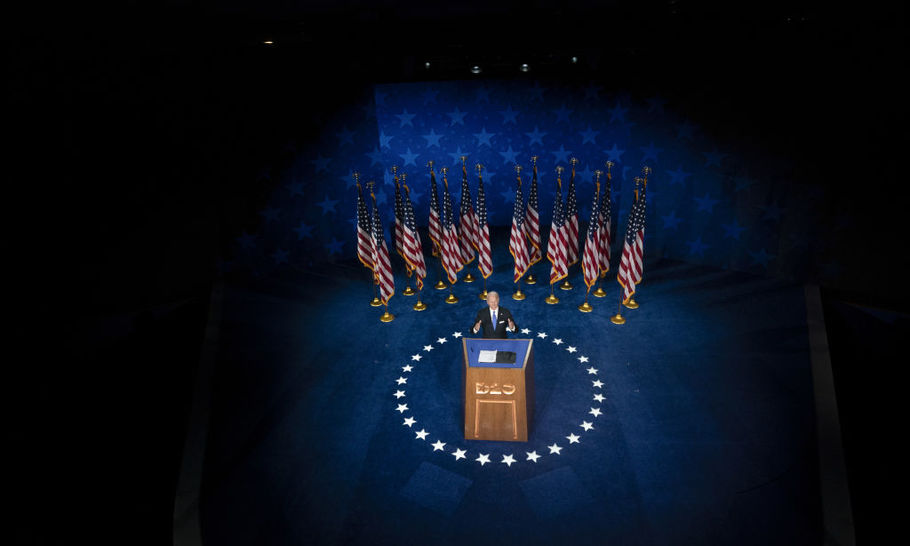Why Trump should be worried

Photographer: Stefani Reynolds/Bloomberg via Getty Images
The Democrats’ virtual jamboree is now over. Joe Biden delivered the best speech of his life, then stood (appropriately masked) with running mate Kamala Harris, hands raised in what they surely hope is a rehearsal for a November victory celebration. Showing that they’ve learned from the internecine battles of 2016, the Democratic Party Convention made their theme “unity,” and hit viewers with peace, love and understanding at every chance they got. Moderates complimented leftists, the Old Guard (the Clintons, the Carters) graciously passed the torch, while the New Kids (Alexandria Ocasio-Cortez, Stacy Abrams, Pete Buttigieg) embraced a ticket almost certainly too centrist for their taste. The Obamas provided the soaring rhetoric and the searing take-downs of Trump — even Bernie Sanders played nice.
But is all this comity for real? There are genuine policy divisions in the Democratic Party, between those who favour a single-payer healthcare system and those (like Biden) who want to beef up Obamacare, between those pushing radical energy reform, like Alexandria Ocasio-Cortez, and a more gradual approach to climate change, and between those committed to closing most prisons and defunding the police and those terrified that if Democrats were to embrace these ideas they’d never be elected to anything ever again. The party has always been an ideological dog’s dinner, and famously fractious, especially when it comes to presidential candidates. “Democrats fall in love,” the old saying goes, “Republicans fall in line.” Are enough Dems in love with the Biden-Harris ticket that they’ll actually go out and vote? Or will the progressives, angry that they lost out once again to the establishment, stay home?
There’s certainly some sulking on the left, especially among disaffected “Bernie Bros”. Cornel West of the Princeton Center for African American Studies, often a searing critic of Barack Obama, calls Biden a “Neoliberal disaster.” Kamala Harris comes in for criticism as a political opportunist who moved left only when she needed to, and a former prosecutor who failed to call bad cops to account. But the leader of a progressive student group recently admitted, “With a heavy heart, and with great anger and frustration, and with great rage towards the Democratic establishment, I will vote for Biden.” And Saeed Jones, a black poet and activist, took to Twitter, likening support of the Democratic ticket to being stuck in a crowd of racists: “I’m stranded in a sundown town and it’s dusk. Voting for Biden/Harris is me hot-wiring the only car available. It’s janky, I’ve never driven a stick-shift before AND the radio is broken. But I’m gonna make it work if that’s what it takes to get somewhere safer.”
It has clearly dawned on people (those outside the 39 per cent who tell pollsters they plan to vote Republican, at least) that whatever their reservations about Biden and Harris, it’s them or four more years of Donald Trump — four more years of assaults on the environment and the Constitution itself, four more years of corruption, four more years of coddling the 1 per cent, four more years of race-baiting, rage-tweeting, and misogyny. Maybe four more years of coronavirus, as well: Trump’s lack of a coherent national policy on Covid-19 has meant 5.6 million people infected and nearly 175,000 dead. The US has four per cent of the world’s population and 25 per cent of the world’s coronavirus cases. This is scary stuff.
In contrast, the Democratic National Convention presented a sober yet hopeful vision of what America could be. Speakers from Michelle Obama to Hillary Clinton to billionaire Mike Bloomberg to tech entrepreneur Andrew Yang to the Republican former governor of Ohio, John Kasich, to the Veep actor Julia Louis-Dreyfus, emphasised the importance of science in addressing this global pandemic. Democrats promised an America that would be tolerant, smart, and extraordinarily diverse: the roll call of states, usually a chaotic tangle of people in silly iterations of Uncle Sam’s top hat jostling for a place on an area floor, loudly proclaiming the virtues of Iowa butter or Georgia peaches as they deliver the delegate vote tally, was a glorious travelogue of locations from near the Arctic Circle to the Gulf of Mexico, presented by people from a dizzying array of ethnicities. The Northern Marianas Islands delegate spoke Chamorro, the Puerto Rican delegate spoke Spanish, and representatives from New Mexico, Alaska, the Dakotas and other places delivered their votes in a mix of ancient indigenous languages and English. This is the America many of us want to live in, not the white, conservative suburbs of Donald Trump’s imagination.
The pandemic, the terrifying number of people out of work, as well as demands for racial justice arising out of the murders of Breonna Taylor, Ahmaud Arbery and George Floyd, may be creating a new sense of urgency, a conviction that America really needs to change coupled — somewhat paradoxically — with the strong sense that Biden, Washington veteran though he is, represents the best chance for a national reset. He’s the safe pair of hands. Kamala Harris, a woman of Jamaican and Tamil heritage who identifies as black, embodies the hope for diversity. Of course, it’s ten weeks till November 3rd, America’s official election day. Anything could happen. But judging from the kind of energy coming out of the Democratic Convention, Donald Trump has a lot to worry about.




